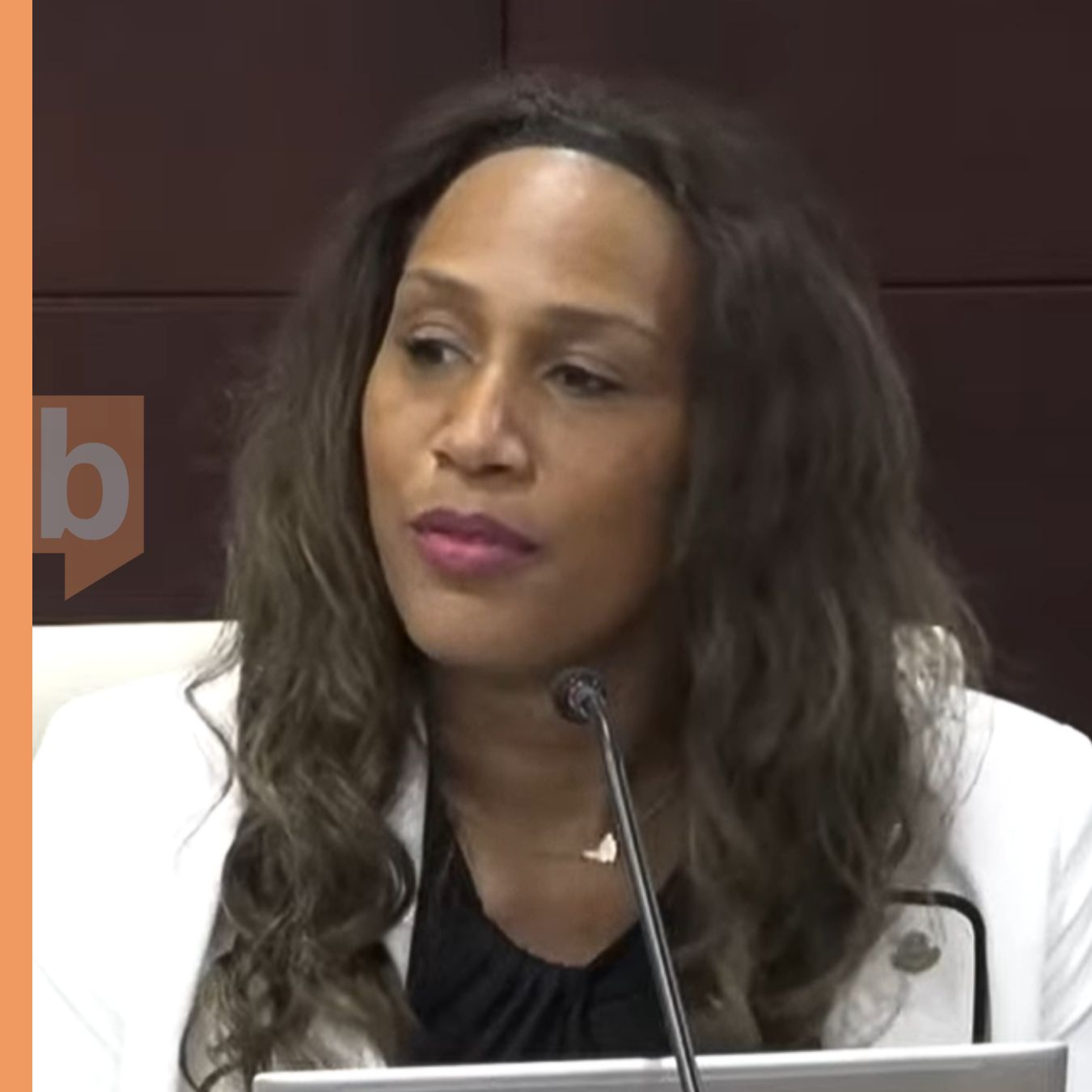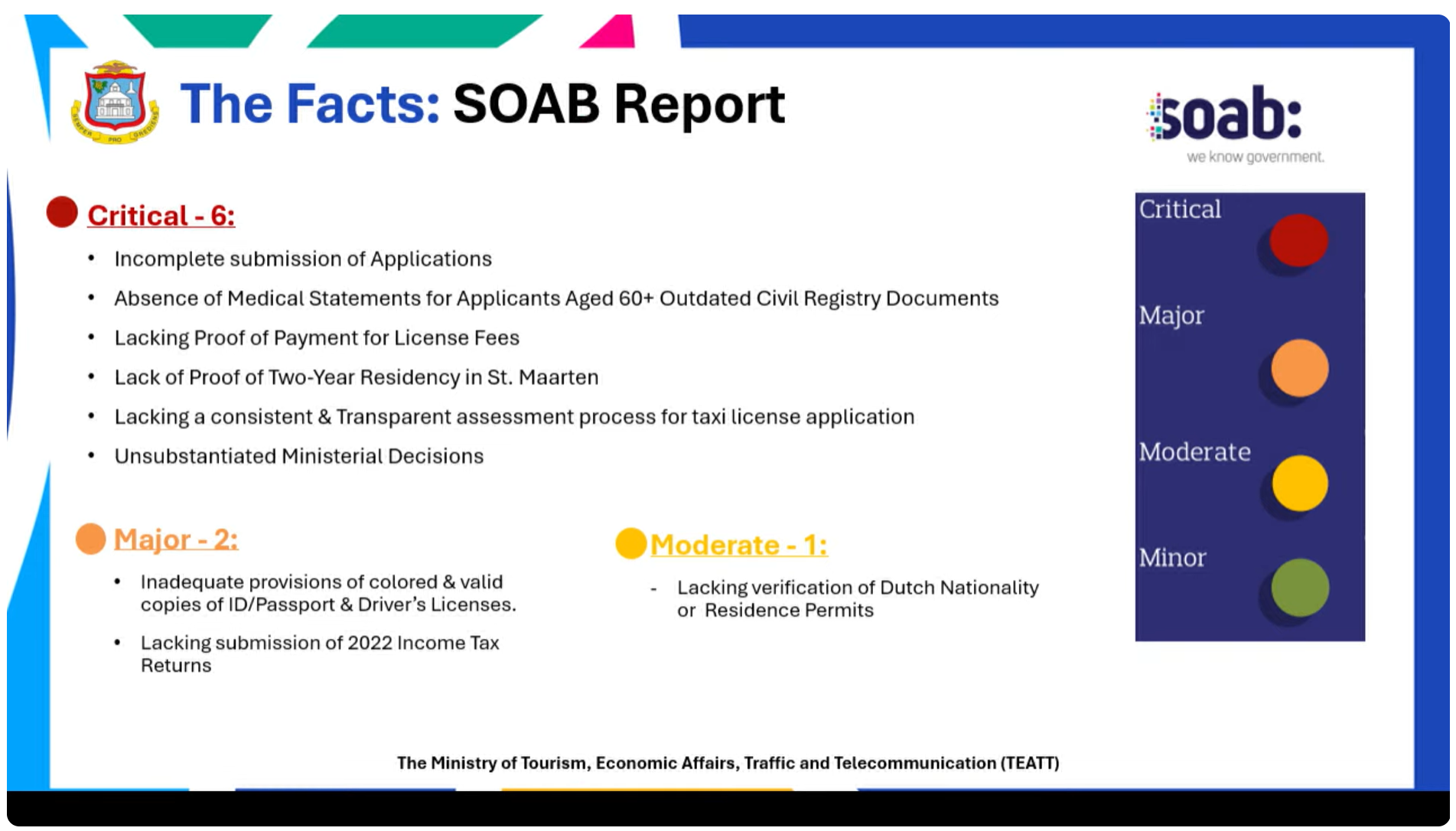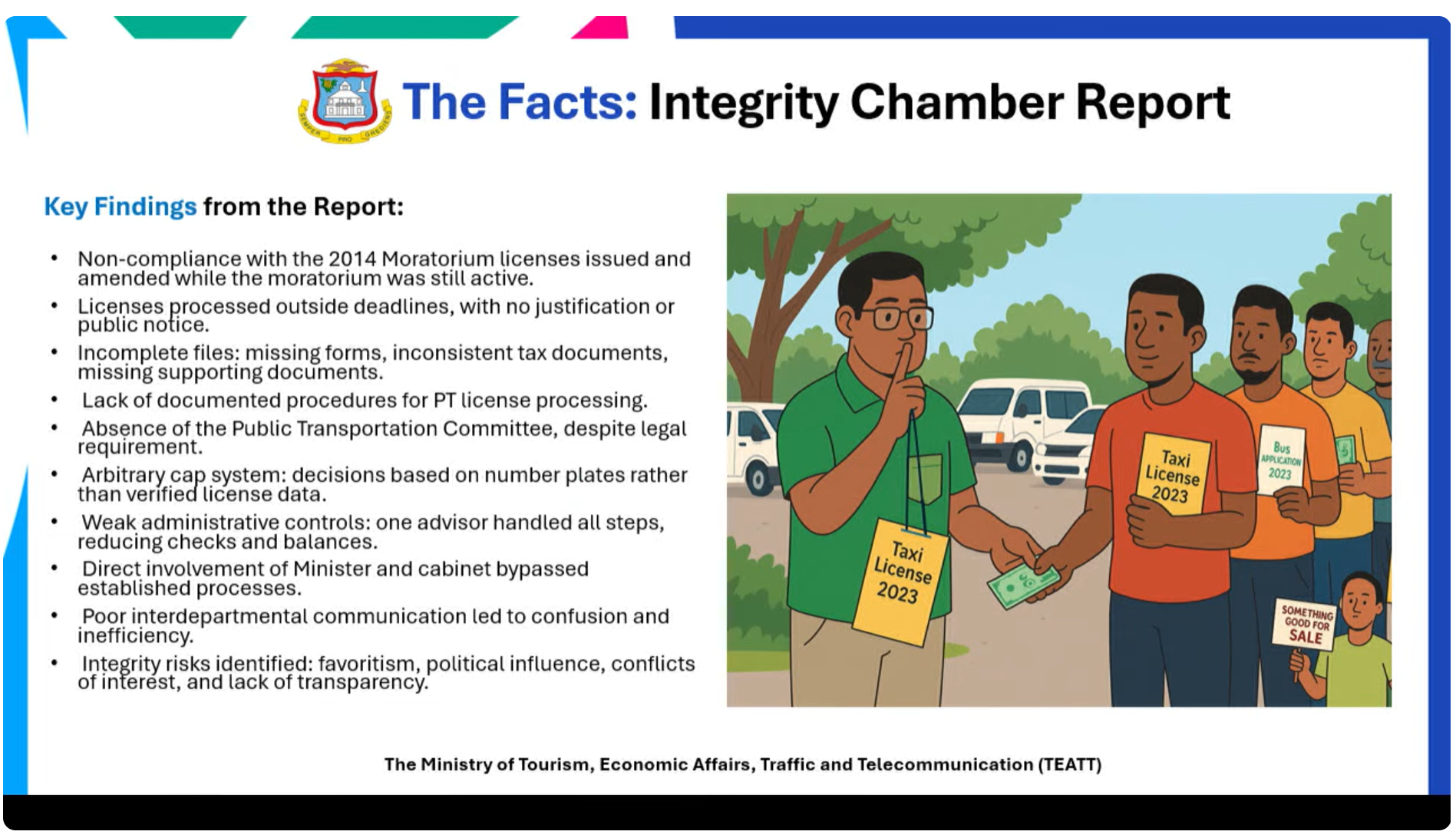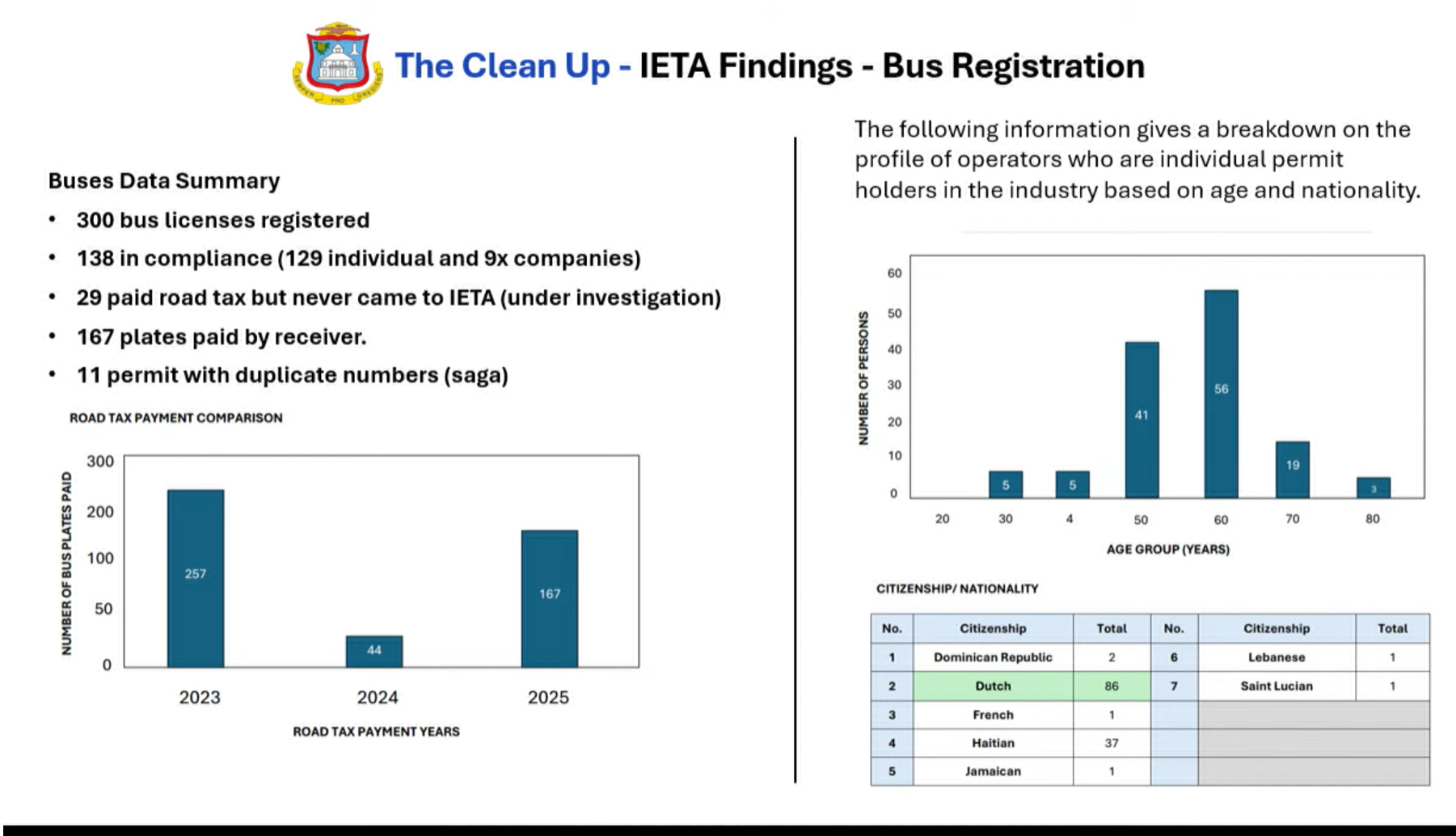“You deserve better” Minister apologizes for extortion and chaos in transport sector

GREAT BAY--"People of Soualiga , over the past months, much has come to light regarding the state of the public transportation sector and its operation, its challenges and the difficult truth. What we have seen and read is not about pointing fingers but about acknowledging where systems have failed and how we together set them right. Let me be clear, this situation was not created by this government, but it will be corrected by this government.”
TEATT Minister Grisha Heyliger-Marten delivered that message to Parliament on Thursday as she laid out a stark picture of extortion, illegally issued licenses, missing paperwork and a sector that, in her words, has been left in “chaos” by the previous TEATT administration.
“I find it very sad and disheartening to have conversations of this nature with persons. It has shown me and my team that indeed reform on public transportation is needed. The illegal activities of renting licenses at ridiculous fees must stop. In addition, no one should have to pay someone to acquire a document that is naturally applied for at government. While a moratorium was lifted, nobody should be extorted to pay for a license beyond the legal fees required,” she said.
On behalf of government, she then issued an apology.
“On behalf of the government, I extend an apology to every operator and citizen who has suffered from extortion, waited endlessly for answers, or struggled under the weight of oversaturation and uncertainty. You deserve better, and better is what we will deliver. Through sound policy, renewed integrity and collaboration, we will restore legitimacy to this process, fairness to the system and pride in the industry that keeps our economy and our people moving forward. Because together, we will get it done.”
Setting the tone: apology, extortion and a warning
Heyliger-Marten framed her presentation as both an explanation and a line in the sand. She said she had received messages from victims of extortion involving licenses, including at least one person who is already, according to her, in discussions with the Prosecutor’s Office and who gave permission for their situation to be referenced in Parliament.
With that, she issued a warning to those who profited from the system.
“Ladies and gentlemen, we have seen clearly where the system failed. It took this ministry over a year to uncover what should have never happened. Licenses issued without proper oversight, rules ignored and the sector left in chaos. And to those who labeled it a clean-up while selling bread off one to feed another, your clean-up was a cover for shortcuts. Shortcuts that made the problem worse.
“To those who brag that they did nothing wrong, know this, the record will speak for itself and the law will follow. It is unfortunate that some will suffer due to the gross mismanagement of the former TEATT administration as we restore fairness, but accountability is necessary if we are to rebuild trust,” she said.
“We will get it done by properly regulating all licenses and enforcing the rules. We will get it done by protecting honest operators and removing those who exploited the system. And lastly, we will get it done by restoring integrity, transparency and confidence in our sector.”
Why she came to Parliament
Earlier in the meeting, Heyliger-Marten asked the Chair permission to briefly respond to criticism about her social media posts announcing her presence in Parliament. She explained that, given her background in marketing, she always posts when she is going into Parliament so the public can tune in. She also joined MPs in extending condolences to the family of taxi driver Oliver Williams Jr., and requested a moment of silence in his memory, noting that the meeting was focused on taxis.
She then moved into the formal presentation, outlining her agenda:
- Introduction and context
- Setting the record straight on laws, policy and definitions
- Facts and timelines, including the SOAB and Integrity Chamber reports
- The internal “clean up” and data from TEATT
- The current state of affairs, problems and realities
- A public message on transparency, integrity and trust
- The way forward and final words
“Today we stand at a critical junction in the history of St. Maarten’s transportation sector,” she said. “For far too long our taxi, T-plate and bus industry has been clouded by uncertainty, lack of transparency and decisions driven at times by political expediency rather than good governance.”
Before becoming minister in May 2024, Heyliger-Marten reminded MPs that she had sat on their side of the aisle, repeatedly questioning permit issuance. “The answers received were inconsistent, incomplete and at times intentionally evasive. Permits were handed out recklessly, the market was saturated and the stability of the industry was compromised,” she said.

Three investigations, one conclusion
The minister described three parallel tracks of scrutiny into the sector:
- SOAB audit
In March 2024, government audit bureau SOAB was engaged to investigate whether proper processes had been followed in taxi licensing. - Integrity Chamber investigation
Three months later, the Integrity Chamber approached her office and launched its own investigation into the issuance of bus and taxi licenses, triggered by media reports, complaints and parliamentary questions. The scope was limited to 2023. - TEATT’s internal review
After being sworn in, Heyliger-Marten said she inherited “a sector in disorder.” For over a year, her team gathered and verified information, combing through documents, decisions and testimonies. Internally, they began calling it the “Satpass Saga”, because every new layer led back to the same period and the same cluster of decisions in 2023 and early 2024.
“Both the ministry’s internal findings and the Integrity Chamber investigation reached the same conclusion. Our transport license framework is outdated, inconsistently applied and vulnerable to misuse. Too many decisions have been made without full documentation, structured checks or transparent criteria,” she said.
What SOAB found
SOAB focused on taxi licenses and examined a sample of 79 applications out of 80 files made available. Its scope covered:
- Compliance with laws, policy and procedures
- Accuracy and completeness of documentation
- Lawful issuance of licenses
- Revenue collection and accounting
- Process functionality and risk
According to Heyliger-Marten, SOAB rated six parts of the process as “critical” risk, two as “major” and one as “moderate”. No area was considered “minor”.
The audit found that:
- Out of 79 new applications, only 26 were complete with all required documents.
- Although most applicants submitted IDs, 27 did not provide the requested 2022 tax return cover page and one submitted the wrong year.
- None of the 14 applicants over 60 submitted the required medical proof from a general practitioner.
- Several applicants either submitted outdated civil registry extracts or none at all.
“Despite several applicants failing to meet the necessary requirements, licenses were still granted without proper legal basis,” the minister said.
SOAB recommended a “full digital overhaul and governance reset”, including:
- A centralized digital registry of all licenses
- Periodic internal and external audits
- Stricter application processes and cross checks
- Digital monitoring of license use and enforcement for non-compliance
- Formal feedback channels with operators and the public
- Better staff training, whistleblower protection and use of GPS and analytics
- Annual policy reviews and stronger external oversight
“These reforms would digitize oversight, minimize manipulation and modernize the entire license framework,” Heyliger-Marten summarized.

What the Integrity Chamber found
The Integrity Chamber’s mission, she reminded MPs, is to promote integrity and ethical behavior in government and society.
Its investigation into bus and taxi licenses sought to answer five questions, including:
- What is the legislative framework for granting bus and taxi licenses
- Can authorities deviate from that framework, and if so, under what conditions
- Did administrative bodies adhere to the framework, or did actions or omissions harm government functioning or the public interest
- Are there integrity risks or gaps in the legislative framework
Key findings included:
- Non-compliance with the legislative framework in multiple stages of the licensing process
- Licenses issued before the revised 2023 moratorium was formally published
- Deadlines ignored and licenses granted outside official submission windows
In short, the Integrity Chamber confirmed that laws and procedures were not properly followed, and that the system contained structural gaps which allowed this.
The “clean up” and what TEATT’s own data shows
Heyliger-Marten stressed that she did not “sit back” while the investigations were ongoing.
In January 2025, the Inspectorate of Economic Affairs and Transportation, commonly called IETA, started a structured internal cleanup. Every taxi and bus operator was required to present themselves so the ministry could confirm the validity of permits, the accuracy of documentation and the condition of vehicles.
“This was not about punishment, it was about protecting the integrity of the industry and ensuring everyone operates on the same fair, transparent playing field,” she said.
The goals of the confirmation process were:
- To ensure all operators were legally operating with a valid permit
- To update and maintain an accurate 2025 database of active operators
- To strengthen transport control and enforcement with verified data
- To address issues seen in 2024, including unregistered operators, expired assistant driver permits, illegal plate sharing and non-compliant vehicles
- To improve road safety by ensuring vehicles met operational and safety standards
The minister then walked Parliament through a timeline of announcements and actions from mid-2023 up to August 2025, including:
- Public notices on a “cleanup” and on amendments to licenses in 2023
- A September 2023 email from the department head to the minister and cabinet confirming that a moratorium remained in effect
- The January 2024 election period
- A March 2024 press moment where former minister Arthur Lambriex announced that 142 taxi and 94 bus permits had been issued, around the same time SOAB began its investigation
- Her own swearing in during May 2024, followed by the Integrity Chamber’s launch of its investigation and her public decision to hold off on issuing new licenses
- A confirmation letter process from January 2025 onward, with multiple deadline extensions up to August 8, 2025
- Completion of the SOAB report in March 2025 and the Integrity Chamber report in April 2025
- Complaints to the Ombudsman and the minister’s decision to again impose a moratorium in July 2025
Old licenses vs new licenses
Comparing older licenses to those issued during the 2023 moratorium lift, the minister pointed to several differences:
- 2013 licenses were in Dutch, carried an ink stamp from the ministry, had clear application and processing dates and each permit had a unique number tied to a single vehicle.
- 2023 licenses were in English, did not have a physical stamp next to the ministry stamp, were issued in less than two months and carried no license number, division number or grid number.
Conditions printed on the newer licenses also suggested that, based on the ministry’s data, some recipients should not have qualified.
“In addition, it was considered unfair to have such a process expedited when the department itself struggled with backlog for various licenses that were received way in advance,” she said.

How many buses and taxis really operate
From the confirmation process and cross checks with the Receiver’s road tax data, TEATT now estimates:
- Bus operators
- 167 active bus operators for 2025
- 300 bus licenses in the system, of which 129 are individual permits and 9 are company permits that together account for 38 plates
- Only 29 plates actually registered as being in use by August 2025 based on road tax, which means over 100 permits either correspond to non-operational buses or operators not in compliance
The average age of confirmed bus drivers is 61, with the oldest at 86 and the youngest at 30. Most have Dutch nationality, with a significant group of Haitian descent.
TEATT information also shows that 87 new bus permits were issued in 2023. Of these, 66 appear in IETA’s system with road tax paid, while 21 do not. Eleven permits have duplicate numbers, including examples where division and grid numbers are identical on two different permits.
“All of those issued during the saga are only on paper,” Heyliger-Marten said. “They are not found in our digital system, only in an Excel sheet.”
- Taxi operators
- 454 taxi operators completed the confirmation process and could be cross-referenced with road tax data
- 451 of them had paid road tax, meaning three had not
- 27 names on the TEATT list did not appear in the road tax list, which could indicate vehicles not in the operator’s name or late payments
- In total, around 600 taxis are registered in TEATT’s system, which suggests more than 100 licenses are out there without full compliance
According to the ministry, 136 new taxi permits were issued in 2023. Of these, 107 appear among the 450 verified operators, while 29 do not. Another 34 permits encountered during verification did not appear in the 2023 Excel list.
“There are approximately 30 or more permits that are simply unknown to IETA at the moment. We have cases where two permits share the same number and in one of those cases the supposed permit holder is deceased,” she said, noting that one death was confirmed through a Daily Herald obituary.
Touring cars and “creative” structures
The minister also flagged irregular practices in the touring and group transport segment:
- A touring company with one permit for five vehicles, each using a different “doing business as” name, all registered at the Chamber of Commerce
- T-plates on vehicles that do not match the Chamber of Commerce registration name
- Companies registered as touring operators holding car rental permits instead of proper touring permits
“The cleanup provided a detailed look into how the passenger transport sector functioned and highlighted both progress and critical regulatory weaknesses,” she said.
An oversaturated sector compared with neighbors
Heyliger-Marten then placed St. Maarten’s numbers in a regional context, using approximate figures for stayover visitors, cruise passengers, population and vehicle counts.
St. Maarten, with a population of about 50,000, roughly 700,000 stayover visitors and 1.6 million cruise passengers, has:
- Around 600 registered taxis, and
- Around 300 registered buses
By comparison, she said:
- French St. Martin has about 150 operating taxis and around 40 buses, although its cap is higher. Taken together, the whole 37 square mile island has about 750 taxis and 340 buses.
- Aruba and Curaçao both operate with fewer taxis and buses relative to their larger populations and visitor numbers, with curated increases and stricter regulation.
- St. Kitts also maintains a regulated cap, with around 520 taxis and a controlled bus system.
The message was clear: St. Maarten’s sector is not just disorganized, it is also heavily saturated.

A system that invited abuse
“The 2024–2025 passenger transport review provided a long overdue reality check,” the minister said. “What began as a data cleanup exercise evolved into a full diagnostic of the ministry’s systems, industry behavior and institutional gaps that have weakened regulatory credibility for years.”
Among the operational issues identified:
- Buses not stopping at designated bus stops
- Vehicles in poor condition
- Plate holders driving other people’s vehicles
- Use of third-party insurance and multiple business names for the same operation
- Companies authorized for five vehicles operating as many as eight
- Outdated or mismatched Chamber of Commerce data
- Side agreements between hotels, tour operators and transport providers that affected industry stakeholders
“At the same time, the project delivered some progress. Operators now have a clearer understanding of compliance and expectations. Road tax collection improved through verified data, and the ministry now has a more accurate digital foundation for future enforcement and reform,” she said.
“The lessons underscore a single truth: without structure, clarity and enforcement, integrity becomes vulnerable and public trust suffers.”
Five phase reform plan and a transport authority
To fix the sector, Heyliger-Marten outlined a five phase plan:
- Phase 1: Data verification and compliance
Already underway and largely completed. This covers the clean up of permit records, verification of insurance, road tax and inspection, and a clear distinction between active and dormant permits. - Phase 2: Permit regularization and driver certification
This is the current phase.- Non-compliant and dormant permits will be revoked, but the minister said this will be done cautiously because some people were “innocent” or naive about the process.
- Government will issue a public summons listing permits and plates deemed non-compliant and give holders a final chance to present documents. Failure to respond by the deadline will lead to automatic revocation.
- A certification program will be launched, covering island knowledge, customer service and safety, including medical checks for drivers. The ministry will seek financial assistance to help operators complete certification.
- Phase 3: Legislative framework
- Draft amendments to the Passenger Transport Ordinance, in consultation with the industry.
- Introduce a digital dispatching system with stakeholder input.
- Phase 4: Finalization of ordinance and decree
- Submit finalized legislation to Parliament for debate and approval.
- Consolidate into one unified transport policy.
- Phase 5: Establishment of a Transport Authority
- Create a central authority to oversee public transportation.
- Gradually transition operational responsibilities from the ministry to this authority.
The timeline she presented:
- 2025: Cleanup and certification
- 2026: Drafting of laws and pilot of digital dispatching
- 2027: Final laws passed and transport authority established
She said TEATT is strengthening cooperation between IETA, the Receiver’s Office and the Chamber of Commerce to keep databases aligned, enforcement consistent and the annual confirmation process permanent and more robust.

“Your clean up was a cover for shortcuts”
In one of the more pointed political sections of her presentation, Heyliger-Marten returned to the 2023 “cleanup” undertaken under the previous minister.
MP Sarah Wescot-Williams had asked her what exactly the August 13, 2023 announcement had meant. “It was a cleanup, that was their version of a clean up,” the minister answered. “When they swapped and removed, that was what they called a clean up, compared to what we are doing and still doing now, because it is not easy.”
She repeated her criticism: “To those who labeled it a clean up while selling bread off one to feed another, your clean up was a cover for shortcuts that made the problem worse.”
Heyliger-Marten insisted that while some will inevitably feel the consequences of a stricter approach, the responsibility for that lies with those who abused the system.
“Let me be clear, this situation was not created by this government, but it will be corrected by this government,” she said again near the end of her presentation.
“The transport sector touches every household, every commuter and every visitor. Reforming it is not about punishment, it is about restoring order, fairness and public confidence in one of our country’s most visible services. That is the work we began, that is the work we continue and that is the work we will deliver. We will get it done.”
Join Our Community Today
Subscribe to our mailing list to be the first to receive
breaking news, updates, and more.





